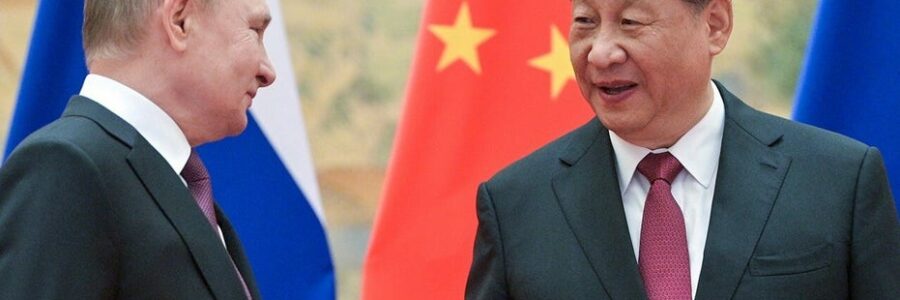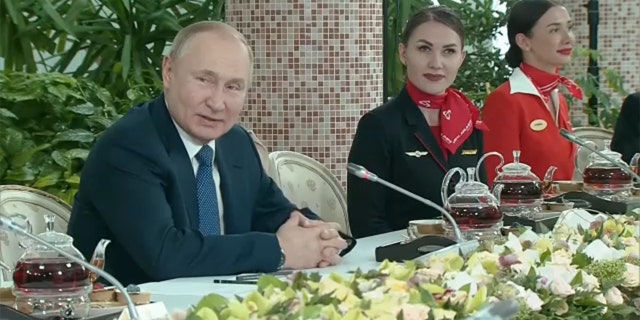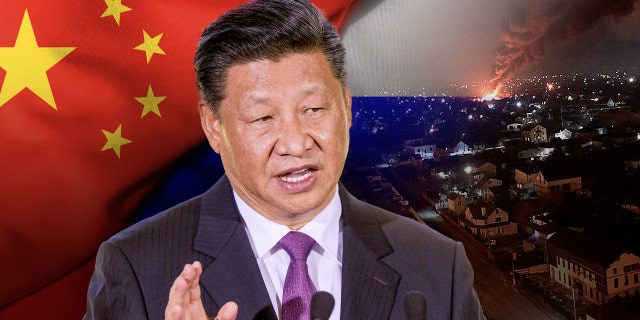
China's Xi and Russia's Putin backstab Biden
Gordon Chang: China is ‘all-in for Putin’
In President Joe Biden’s State of the Union address to the nation last Thursday, following the Russian land, sea, and air invasion of Ukraine, he admitted that no one thought sanctions would stop President Vladimir Putin from carrying out the largest attack against a European state since World War II.
Let’s set aside that Biden admitted his own strategy in anticipation of the invasion was flawed – even though his administration considered it a certainty. If he didn’t expect sanctions to stop Putin, what then did he think would deter the crisis in Ukraine from erupting?
Apparently, the Biden administration bet the Chinese Communist Party would help out.
The New York Times last Friday, reported, “Over three months, senior Biden administration officials held half a dozen urgent meetings with top Chinese officials in which the Americans presented intelligence showing Russia’s troop buildup around Ukraine and beseeched the Chinese to tell Russia not to invade, according to U.S. officials.”
Russian President Vladimir Putin spoke to female flight attendants in comments broadcast on state television on Saturday, March 5, 2022. (Image: Reuters Video)
( )
After one of the talks in December, the Biden administration learned that instead of Communist China’s officials persuading Putin to pull back, “Beijing had shared the information with Moscow, telling the Russians that the United States was trying to sow discord – and that China would not try to impede Russian plans and actions.”
Reading between the lines, this sudden release of information by the Biden administration appears to spin the message that President Biden tried to stop Putin’s invasion months ago, and he blames the Chinese Communist Party for not following his request.
As former Speaker of the House Newt Gingrich and I detailed in “Trump vs China: Facing America’s Greatest Threat,“ the Chinese Communist Party is responsible for a lengthy list of violent, oppressive, and deceitful transgressions – not least of which includes the genocide in Xinjiang, the coverup of the origins of the COVID-19 pandemic, and the elimination of freedom and autonomy in Hong Kong.
If you study the actions of the Chinese Communist Party since the founding of the People’s Republic of China in 1949, it is clear their officials’ response to the U.S. request should be expected. It’s perfectly in accordance with the Party’s pursuit to make China the global superpower by 2049.
Why on Earth would the president of the United States of America rely on an adversary to diffuse a dangerous escalation by a foreign dictator? Further, while the Chinese Communist Party and the Kremlin do not have a formal alliance, they are strategic partners (meaning that when it benefits General Secretary Xi Jinping and President Putin, they work together).
Before this year, Xi and Putin met 37 times. Just last month, they met again and issued a more than 5,000-word joint statement which articulated a “redistribution of power in the world” and criticized the United States by name six times. Xi affectionately refers to Putin as his “best friend.”
For evidence of their transactional comradery, look no further than the photos of Xi and Putin making pancakes together in 2018, taking a boat cruise along the Neva River in 2019, or the cake and ice cream that Putin gave Xi on his 66th birthday.
Did the administration honestly believe that the Chinese Communist Party didn’t know what Russia had planned for Ukraine? Did the White House think Communist China would really side with the United States and stop Putin? What did President Biden honestly think these two “best friends” discussed when Putin went to China for the Genocide Olympics last month?
It was never in Communist China’s interest to stop Putin’s invasion of Ukraine. Ultimately, the Chinese Communist Party benefits from this aggression in the long term. First, the Party gets to learn the U.S. playbook for dealing with conflict between foreign countries (adding to what China learned about U.S. military tactics during the Gulf War in real-time). Sharing our intelligence with Communist China also could expose U.S. sources and methods of intelligence gathering in Russia.
FILE – China’s President Xi Jinping addresses the press next to Argentina’s President Mauricio Macri (not in frame) after a working meeting at the Olivos Presidential residence in Olivos, Buenos Aires on December 2, 2018.
( )
Now, regarding the possible Chinese invasion of Taiwan, the western response to the invasion of Ukraine may have given Xi cause for concern. However, the attack on Ukraine isn’t necessarily a perfect analogue. The U.S. economic relationship is much different with Russia than it is with China. We’ve repeatedly seen American companies fail to condemn the Chinese Communist Party for its genocide in Xinjiang. Instead, they pressure U.S. politicians to kill legislation that would hold the Party accountable.
Furthermore, while Washington and media are watching Russia, the Chinese Communist Party is once again able to return to the playbook of Deng Xiaoping – hiding its capabilities and biding its time.
After all, Congress remains gridlocked on enacting policies that strengthen America and counter the Chinese Communist Party’s ambitions (only three of 238 bills targeting China passed in Congress as of December 2021), and President Biden has done a 180 degree turn from President Trump’s leadership in making this a priority.
Amid these revelations, and in the aftermath of the weak State of the Union address, it is evident America needs a leader who will boldly and courageously stand up to the most dangerous threats our country currently faces. Let’s hope that President Biden starts living in reality – sooner rather than later.
Source: Read Full Article





